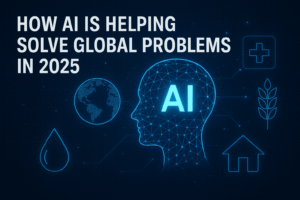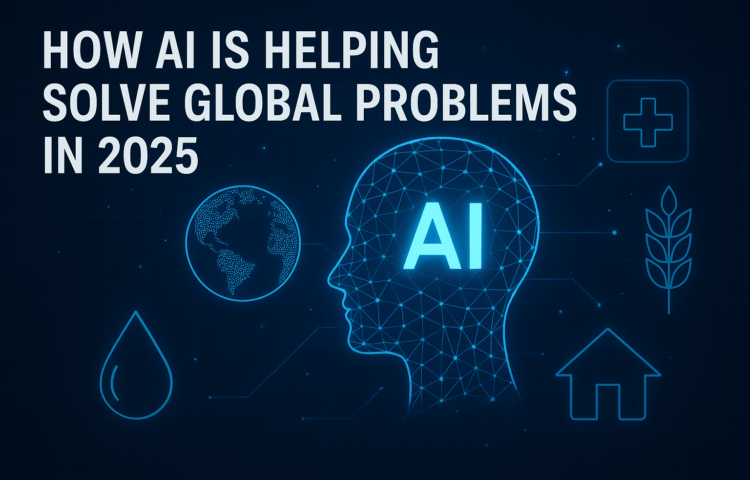How AI Is Solving Global Issues in 2025
Artificial Intelligence (AI) has gone beyond mere hype—it’s now an unstoppable force for making real change across the globe. In 2025, AI is not only revolutionizing businesses and communication but also aiding in the solution of some of the world’s biggest issues, including climate change, healthcare, and education.
Let’s see how AI is positively influencing the world today.
1. Fighting Climate Change
Climate change is one of the most critical global issues, but AI is giving us new hope.
AIbased systems scan satellite data, weather trends, and carbon outputs to enable scientists to predict climate patterns more reliably. Machine learning algorithms are being employed by companies to enhance energy efficiency and limit wastage across manufacturing and agricultural sectors.
For instance, AI models currently assist in monitoring deforestation in real time and propose improved reforestation methods, promoting environmental sustainability.
2. Transforming Healthcare
In 2025, healthcare is still being revolutionized by AI. AIpowered tools assist physicians in earlier detection of diseases, processing medical images quicker, and even anticipating health threats before symptoms are developed.
From detecting cancer and heart disease to treating mental health with AI chatbots, technology is bridging the healthcare divide for millions of individuals. In developing nations, health apps powered by AI are allowing patients to receive remote diagnoses and treatment plans, even without the proximity of a physician.
3. Enhancing Food Security
AI is proving to be a gamechanger in food production and agriculture. Farmers are increasingly employing AI drones and sensors to track soil condition, identify diseases among crops, and selfadjust irrigation systems.
These technologies ensure more food production with fewer resources by maximizing yield and cutting down waste.
AIpowered supply chain systems also avoid food wastage by forecasting demand and optimizing distribution — a huge leap toward eliminating world hunger.
4. Ensuring Clean Water Availability
There are still millions of people who have no access to clean water, but AI is changing that.
Machine learning algorithms today identify leaks in water systems, forecast contamination, and improve purification processes.
AI is employed by organizations to determine the optimal places to construct water wells and regulate water supply networks for maximum efficiency.
This helps ensure that clean, safe water finds its way to those in greatest need.
5. Widening Access to Education
Artificially intelligent learning platforms are dismantling obstacles to education. Platforms such as Duolingo, Khan Academy, and Sora AI tutors in 2025 employ learning algorithms to customize instruction to individual students’ requirements.
Students in remote or disadvantaged regions can now receive highquality education in their native language, on affordable hardware. Not only does this close the global education gap but it also equips the future generation of innovators and thinkers.
6. Assisting Disaster Response
AI systems are being utilized to better predict and manage natural disasters.
By interpreting satellite imagery and sensor information, AI can predict earthquakes, floods, and wildfires more accurately. In crises, AIdriven drones help track survivors, dispense supplies, and coordinate rescue operations — saving thousands of lives annually.
7. Creating a Smarter, More Equal World
AI is also being harnessed for social good — identifying disinformation, tracking human rights violations, and enhancing digital equality.
With ethical use and global cooperation, AI can become a tool that ensures fair opportunities for everyone, regardless of geography or income level.
Final Thoughts
In 2025, Artificial Intelligence stands as a powerful ally in solving global challenges. From protecting the planet to saving lives and empowering people, AI’s potential is limitless when used responsibly.
As technology keeps advancing, one thing is certain — the future of AI and humanity is not competition, but cooperation. Together, we can make the world smarter, fairer, and more sustainable.

